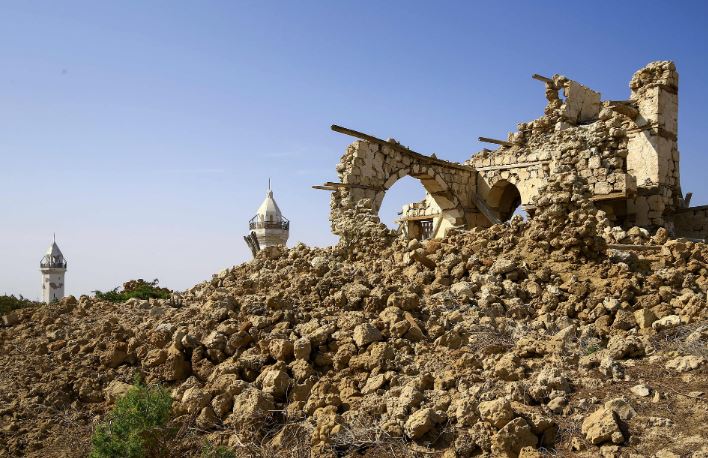TUCKED away on the coast of the Red Sea lies an ancient port city where King Solomon used to banish demons.
For much of its history, the mysterious “Ghost Town” island of Suakin was considered the most prosperous place in the region – but has now fallen into despair after being left to rot for many years.
Dramatic pictures show the ancient city that was once built of coral is now in ruins
AlamyStairs Inside a broken Ottoman coral palace in the port city[/caption]
AlamyA ruined Ottoman Coral Building in Suakin, Sudan[/caption]
AlamyAerial of the ancient and now abandoned port of Suakin on a coral island in the Red Sea in Sudan.[/caption]
Suakin now sits empty except for tour groups visiting the historical place that failed to stand the test of time.
Dramatic pictures show the ancient city that was once built of coral is now in ruins.
Huge old buildings that once served as castles for the rich are now in disrepair.
One aerial shot of Suakin shows the broken structures that have now taken over the length and breadth of the island.
For almost 3000 years, the city served as the most crucial port to many powerful empires that thrived on sea trade because of its strategic location.
It is believed that the ancient pharaoh King Ramses III built the port city in the 10th century BC – and soon turned it into a gated settlement with buildings made out of stunning coral with detailed carvings on stone and wooden walls.
In its heyday, the town was home to over 300 buildings including luxurious palaces, offices, medieval-era banks and public attractions.
The city remained extremely prosperous throughout its existence – and everyone living in the city had banks full of money and gold.
The town was populated by merchants, traders, and the local nomadic tribe of the Hadendowah people.
And around the 15th century, the beautiful coral block buildings became popular all over the world as traders came in from all places.
It was even dubbed the “Venice of Africa”.
Legend has it that one of the kings ruling the ancient city had 360 wives living in lavish quarters throughout the settlement.
It quickly became the bustling hub for not only trade and business but also for religious and spiritual centres.
As Islami gained more popularity in the region, with followers spreading from the Hijaz region of modern-day Saudi Arabia, the port city soon turned into the gateway for Africans to reach the holy Mecca.
For the longest time throughout its history, rumours were that prophet Sulaymān ibn Dāwūd, known as King Solomon in the Bible, used the port to imprison demons.
However, the city began to cripple when the ivory trade that had served as the backbone of the city crashed.
And as the Ivory trade struggled, all other businesses – including shipyards and agriculture – came crashing due to the ripple effect.
The only coral ruins left today are heavily guarded as part of the tourism industry.
But ports from the city are still used to ferry Haj pilgrims from Africa to Saudi Arabia every year.
Meanwhile, another village in the heart of Turkey was left abandoned after ghost sightings.
The town of Kayaköy was once a lively and integrated community of Greek–Turkish people but was left to rot by locals some 100 years ago.
The eerie streets have been left behind, with people able to wander from building to building and have a glimpse at the lives of those who used to live there.
The abandoned homes and buildings now act as a museum that takes visitors through the journey of time.
Visitors today can pay a small fee of £3 at a small kiosk to enter the abandoned city.
AlamyPicture of the Town Gate On Mainland Suakin in Sudan[/caption]
AFPA Sudanese man walks away from an old mosque on the abandoned ancient island of Suakin[/caption]
Leave a comment








